Trust in conversation with Serpentine Galleries
INTERVIEW & INTRO Eva Jäger
Any meaningful articulation of Trust is always incomplete. That's by design. Trust’s form, function and content are each rigorous endeavors in their own right. Founded by friends Calum Bowden and Arthur Röing Baer in 2017, the self-described ‘network of utopian conspirators' has experimented with various governance structures, financial models, communication platforms and research arcs through creative, technical and critical projects. In their five-year journey as a shape-shifting, alt-institution, Trust's USP has always been their community; a tight-knit group of designers, artists, developers and researchers whose appetite and skills-set for building new models matches their critique of existing ones.
As an artist, I've looked to Trust for community and a wellspring of ideas. As Arts Technologies Curator (at Serpentine) they've been allies in our efforts to reconfigure the institution's emphasis on artist-led research and development. In 2019 we started a strand of research into new editorial formats for sharing artistic research. That led to R&D Labyrinths, and ultimately Hivemind, a knowledge game for artists for whom the meta-analysis of their journey is at least as important as their output. So, on the occasion of Hivemind being freely available for anyone to download and use, I got together with Calum, Arthur and Trust’s community maintainer Joanna Pope to talk about Trust's past, present and future.
Eva Jäger: Trust’s origin story is entangled with Novembre’s. Can you tell me about how Trust got its start at HQ in Berlin?
Arthur Röing Baer: The first time we saw the space was actually via Novembre co-founder Jeanne-Salomé Rochat who was running it under the name “Trust Limited”. It hosted a variety of creative practitioners from the fashion industry but also groups like the amazing PWR who are still active members in the shared workspace today.
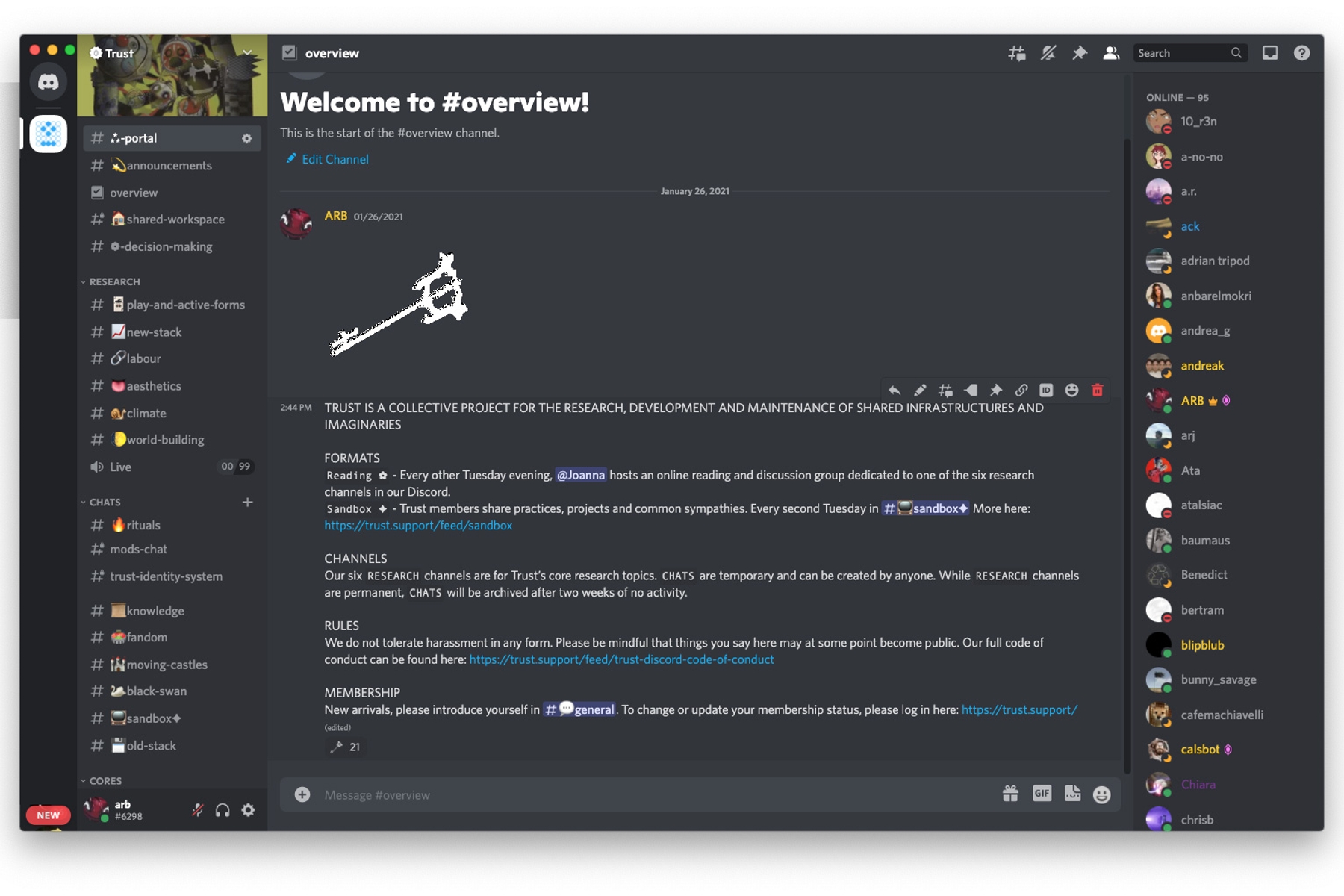
Jeanne-Salomé moved to Switzerland in late 2017, and we had a week to figure out if we wanted to take over the space. We decided it was worth trying to build an experimental events space for an emerging creative field in Berlin that bridged technology and humanities, funded and subsidized by a shared workspace. We shortened the name to Trust (with Jeanne-Salomé's blessing ✨) given our interest in trustless technologies and the realisation that there was a need for a shared workspace, interpersonal relations and... trust – to supplement them.
The first event in our newly opened space was in early 2018 on “Headless Organization and Nonhuman Governance” with Jenna Sutella and Terra0 a theme that we are still pursuing to this day both in programming and in how we structure the organisation itself.
From the start we hosted many events in our physical space that we live-streamed to Twitch, experimenting with ways of documenting lectures and knowledge.

Trust can be a tricky organisation to describe. That might in fact be its strength. I’ll describe it in the following terms: You operate as a physical work space, library and meeting place for their community
––however, your network expands beyond the physical as an ideas-and-infrastructures-prototyping space for their decentralised online community of researchers, designers and artists who communicate & collaborate on projects via a Discord Server and Twitch channel…How would you describe Trust?
Calum Bowden: Trust has always been a project as much about revising and negotiating the way we describe it, while always kind of failing to capture everything. One way of thinking about it is that Trust is part decentralized collective and part extended network and physical space in Berlin.
It started from a dissatisfaction with our educations in speculative design and the rarefied and inaccessible world of speculation. Speculative design is used to open up new horizons and extrapolate from emerging social and technical trends. But often it's not tied to an implementation strategy or a social context, and it ends up being even more abstracted from the here and now than contemporary art. So we wanted to use research, speculation, play, worldbuilding, lore, and experimentation with technology to move beyond totalizing narratives of unavoidable catastrophes, thinking specifically about climate catastrophe, growing wealth inequality and the automation of labor. We wanted to build a community around multidisciplinary research and practice to unlock alternative horizons and to address issues within the current institutional landscape by making our work on Trust as much about researching and prototyping equitable, participatory, and sustainable institutional formations.

Joanna Pope: The process of writing a new description for Trust was interesting. We decided to call it a “network of utopian conspirators, a sandbox for their creative, technical and critical projects, and a site of experimentation for new ways of learning together.”
We’ve always benefited from some strategic vagueness, to give people the space to imagine and create the Trust they want.
Can you use a project or two to explain how you and the Trust community incubate research and experiment by prototyping?
CB: From the beginning, we’ve been adjacent to a nascent creative blockchain space and were always interested in the technology for the possibilities that it offers for distributing value differently through networks and proposing alternative formations for digital platforms beyond advertising-based revenue models. But we've always been aware of the misleading claims of not only the tech industry, but also the art and design worlds and wanted to set out to break down our assumptions about how we think about institutions, communities, and the technologies that mediate and operationalize them. We always understood that the digital infrastructures that mediate our interactions and co-creation to be as much a part of our social context as the building we occupy in Berlin. We ended up prototyping and experimenting with different types of digital platforms and tools and incubating these experimental software projects.

At Trust, projects usually start with a question or a hypothesis and then we'll create a series of experiments that involve the extended Trust community to test these hypotheses and understand our assumptions in a new light. This is a way of trying to grasp the problem space in a methodological way and think about reframing the questions that we're asking rather than quickly jumping to a reductive solution.
Recently, an interesting project emerging out of Trust is a Discord bot called Bubble that allows online communities to post directly to social media. Bubble is developed by Trust member bunkerheads1998. In our case, the bot is posting to Twitter and is our first exercise in articulating a collective voice as Trust. Any message that's posted in Discord can be sent to Twitter, if it receives five of a certain emoji. If you look at the Trust Twitter now, it's all being sourced from conversations that people are having in the Discord.

Another project that has emerged entangled with Trust is called Black Swan and their consensus-building tool Cygnet, which formed out of collaboration between myself and Penny Rafferty, Trust members Laura Lotti and Leïth Benkhedda. In 2021, Black Swan hosted a series of decision making experiments within the Trust Discord, to understand the psychosocial affordances of different ways that communities make decisions. We then used those leanings to prototype a decision-making tool, Cygnet, which we are continuing to test and develop at Trust and in other communities with the help of the developer and OG Trust member Rasmus Svensson of PWR.
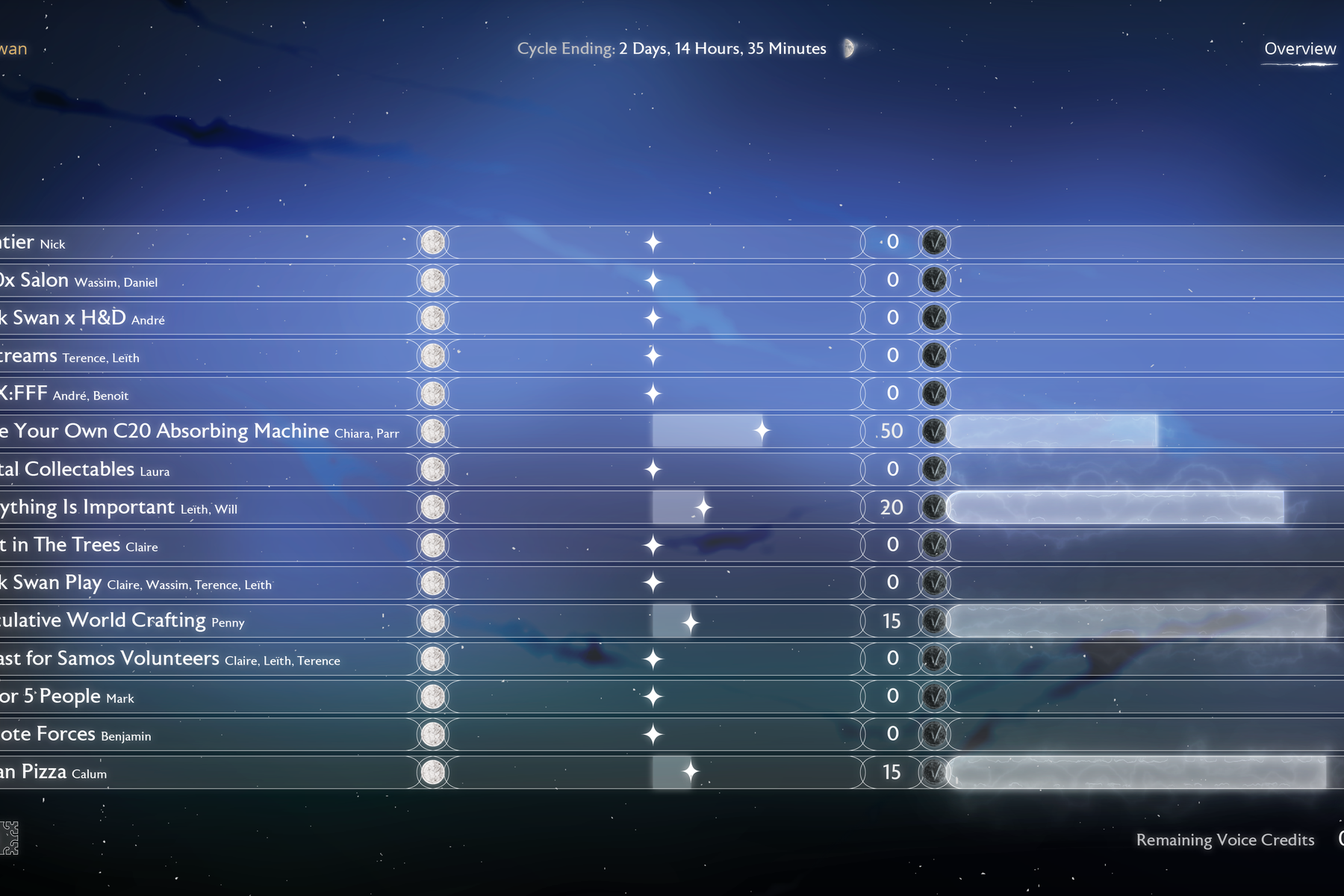
In a lot of your work you are focused on building shared infrastructures - whether that’s through Cygnet, Hivemind, Moving Castles, Etc. Can you talk more about what you mean by ‘infrastructure’ and why you’ve taken up the mantle of building and maintaining at a systemic level?
CB: I think for us infrastructure is that which allows for social reproduction, renewal, and experimentation. It's this base layer substrate on which people exist and create and live.

From logistics, transportation and utilities and critical infrastructures like the electrical grid, to media distribution channels and digital platforms. Meanwhile, in the last years there’s been a discussion within the blockchain industry of public goods, which is a slightly different take on infrastructure. Within open source software there might be a core component that a lot of different softwares rely on that does not have regular funding and does not have a business model attached to it. And yet it might be a really critical piece of infrastructure for a software ecosystem. So there have been discussions in blockchain of how to provide these – what are termed public goods – with sustainable funding so that they can be maintained. And yet this term public goods seems to kind of fall back on 20th century assumptions about a universalized public and a good that is so boiled down that it is somehow a universal moral good.
Shared infrastructure is Trust's way of talking about the things that act as substrates for the Trust network and for our members to have playful, meaningful, productive, or stimulating encounters with each other and research or create together. We try to put the emphasis on maintenance rather than simply creation because generally with creative practice there are so many good ideas. It's very easy to imagine different worlds, but then the work that it takes to actually manifest these worlds and to make sure that if something goes wrong, it's fixed or that there's just continuous care into something rather than a single explosion of energy before moving on to the next thing. We talk about the core team of Trust as ‘maintainers’, where Trust is this thing that exists beyond us, a shared infrastructure perhaps, that we care for and tend to, and try to ensure is sustained over a long period of time.
This is also somewhat about a move from critique and specifically institutional critique – and recognizing what is wrong with the realities that we inhabit – to trying to move towards experimentation with, and the prototyping of, alternate formations. How do we begin responding to our collective critiques? And I think our political argument is that without infrastructures designed around equitable economic relations, where people are benefiting from the value that they create, there can't be alternative worlds or new horizons. Trust tries to think and play with shared infrastructures at the same time as imagining and visualizing possible worlds. Worldbuilding and shared infrastructure. These things need to be co-developed.

ARB: To create a budget to pay maintainers and members that contribute with their research, we collect a monthly fee from members via our own infrastructure. Building our own tools instead of using something like Patreon was a struggle at first in terms of time needed but is now allowing us much more flexibility in how it integrates with our other infrastructural projects and we are in process of building a full dashboard for our members to participate in voting, change their subscription and whatever else we can come up with. It's also great to not have a large percentage of our member contributions go to an external company and make sure it goes directly into funding activities.
Arc One was a recent series of streamed experiments and formats which used game engines to facilitate collective activities and worldbuilding. Arc One was done in collaboration with Moving Castles, another infrastructure project incubated at Trust, to articulate Trust as a decentralised community controlled by its members with a collective voice. Moving Castles is an organisational metaphor for online communities to move away from insularity towards playful interaction and collaboration with other communities. Moving Castles develops tooling and formats to allow the collective control and creation of collective avatars and cross-community gameplay, something we tested for the first time during the recent months.

You’ve highlight that care and maintanance are the kind of followthrough nessesary to live in the new worlds we’re imagining. I suppose this work can happen at many levels and what we need is better incentives to build interoperability. How do you see yourselves as an actor within a larger creative ecosystem. I know from our work together over the last several years that you see value in cooperating with institutions like Serpentine. Can you describe your strategy for working inside and outside of the creative institutional and industry spaces/weaving between them?
ARB: Agency to pursue our own programming as an organization is really important to us, and as member-contributions are the main financial motor of our organization - we have been able to do independent programming. This has allowed us to become an alternative to what exists in the current institutional landscape by combining: technical knowledge, a theoretical approach & a progressive agenda.
We find it important to supplement our network of larger institutions with smaller communities that exist outside of the institutional landscape, and I am happy to say that most of our network actually consists of digital communities of a similar scale to Trust. First contact to many of these communities is done using a reading group format where we temporarily connect members of the two online communities to exchange ideas via chat around a text. Trust as a node, and a contributing facilitator, in a network of small communities and institutions is something we are actively building towards.
CB: It’s also part of a dual power theory of change. One approach, maybe the more dominant way of thinking about systemic change or revolution on the left, is through complete obliteration of what came prior and a blank slate to create a preferred world.
Trust is interested in finding ways of co-creating democratic infrastructures that allow creative communities to relate to each other in playful and equitable ways. And we think that legacy institutions can also play a role in supporting these.
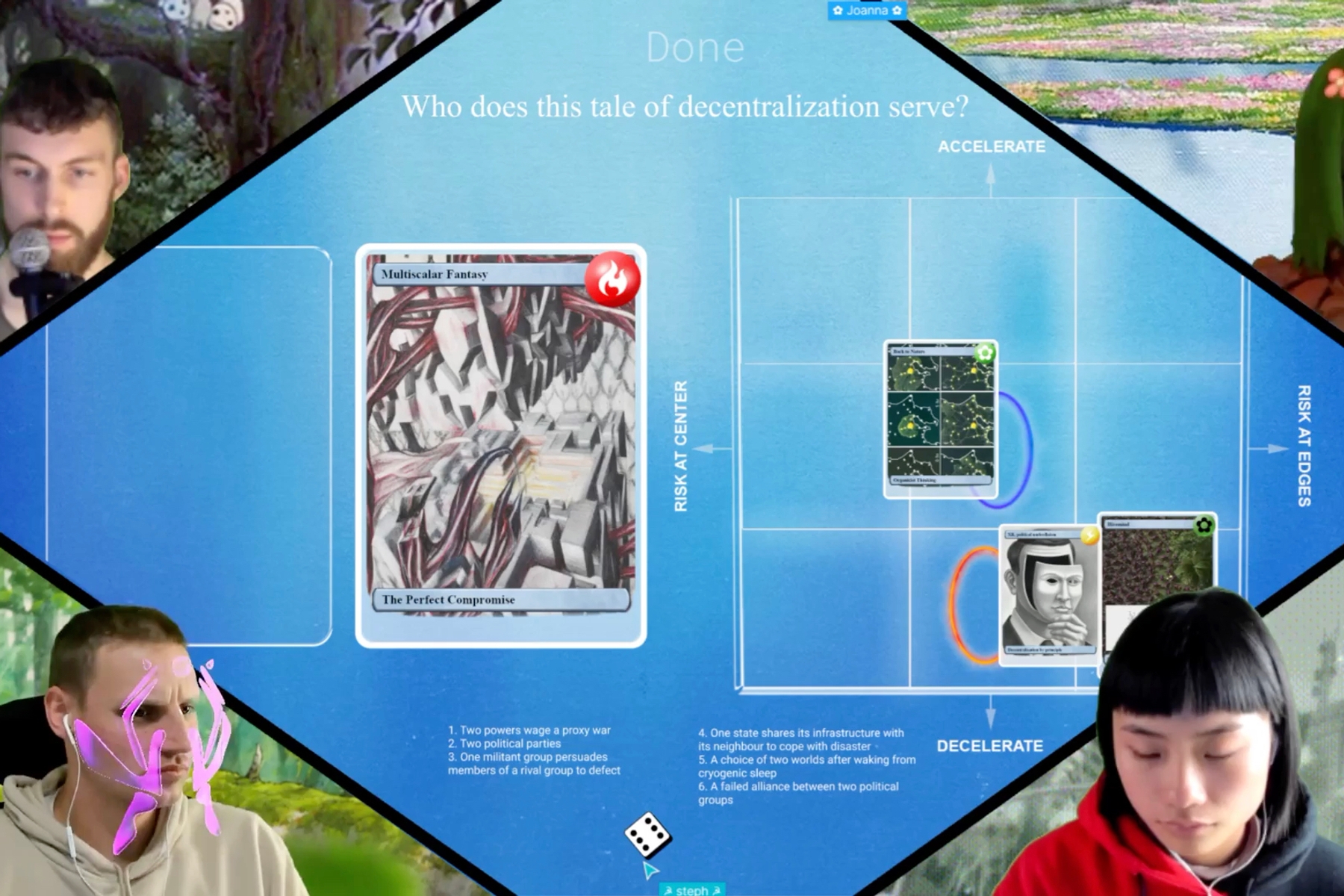
We're also interested in seeing what happens when multiple institutions contribute funding to develop a single piece of shared infrastructure. An example Trust has been working on since 2020 is a project called Millieu, which is an open source web tool that allows people to turn their online communities or group chats into a 2D navigable online environment. This was a project initially funded as a digital commission for HKW in Berlin. And since we've worked with Eyebeam, an art and tech organization in New York, on building Millieu into their website. When we work with an additional partner, they contribute funding to developing this shared infrastructure and the project becomes way more developed from each collaboration.
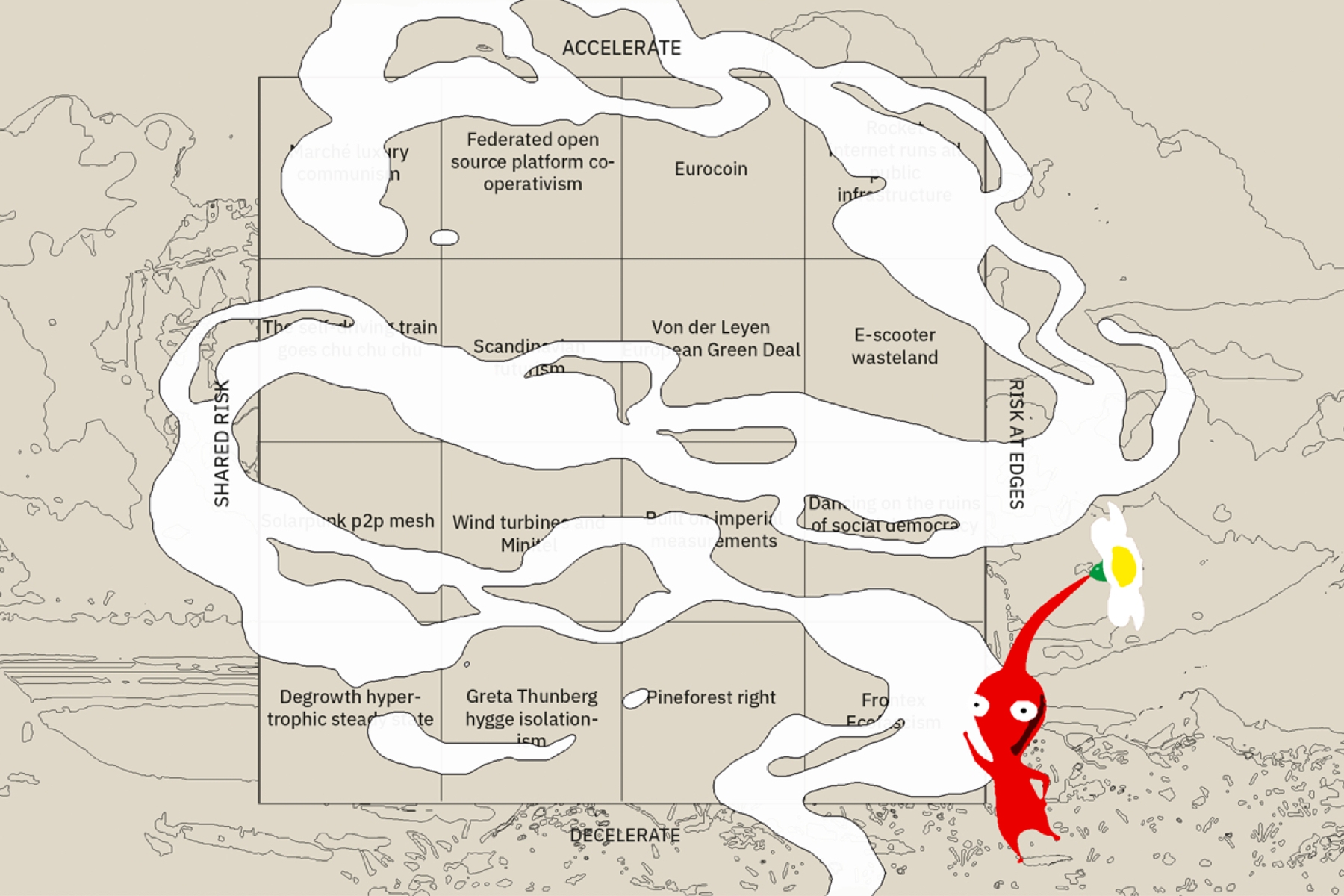
What drew me to Trust initially was the community. Even in the very beginning people knew about Trust and the ideas coming out of the ‘space’ without knowing exactly what it was. In 2018 you published a regular newsletter, ran informal events, rented desks to creative practitioners and kept some free for residents. You were building a system that ensured an influx of new ideas and a community to circulate them. How has that changed since the pandemic?
ARB: Following the lockdowns, our shared workspace was no longer operationally viable and physical events no longer possible, which definitely threw us for a loop. It quickly became apparent that we needed to build something which would allow remote participation and could mirror some of the way that the space facilitated member discourse - which prompted us to start our online membership and treat our discord server as a serious medium to design programming for. I think we were quite early in that respect and it's nice to see that we are now part of an ecosystem of these smaller discord institutions, many of which grew during the pandemic but are now finding their way back into the real world.
JP: I started my role with the Trust community during the pandemic. People were very online so it was a good time to test new formats for online collaboration and exchange. I remember feeling very nervous about it but I wanted to find a way to translate the amazing discussions I had had at Trust IRL events to the server. Now that the pandemic is over, we are exploring hybrid events. Over the past year we started a knitting circle at Trust, which works as a space for energetic restoration. It’s both a relaxing, repetitive physical activity and it’s also social. Group activities that combine a low-stakes creative, technical or expressive practice and a community of caring friends to share space with can create a social environment that is energizing even if you’re more on the introverted side. These spaces can be described following Etienne and Beverly Wenger-Trayner as communities of practice or “groups of people who share a concern or a passion for something they do and learn how to do it better as they interact regularly” and “engage in a process of collective learning in a shared domain of human endeavor”. As we relearn how to interact with the world in the post-pandemic period and shake off some of the social awkwardness that is a very understandable result of multiple lockdowns, communities of practice, whether online or offline or hybrid, can be very helpful.

The Trust Discord is a great example of a productive community space. It has programming every week and it seems like people can get involved at different levels –from joining a reading group to sharing their work within the community for feedback to joining a project team to which you devote time and resources. How did you design the online space and how has the community shaped it?
ARB: We started with an internal workshop looking at our previous programming to isolate some of the larger themes around trust. These themes became the Discord research channels: #play-and-active-forms, #new-stack, #labour, #aesthetics, #climate & #worldbuilding. These channels are at the base of the conversations that happen on the Discord and give the themes for the reading groups, which rotate through these channels. Any member can also start a channel in our more loose categories which now include things like #goblincore, #fandom, #feels and too many others to list here in full. We also have a number of IRL channels in cities where there are enough members to share events and do meetups. Listing these things right now it's clear that it's grown to become quite the large space, hehe - with around 700 people in the discord and daily conversations around different themes.
JP: We’ve always wanted to have a combination of synchronous and asynchronous interaction. Events create social presence and accelerate processes of bonding. We invite members to host online events as a way of welcoming them into the community. Events relate to the channels, and by bringing a certain topic to an event dedicated to a given research channel, members shape the discourse in significant ways. Each person brings something different and experimental to the events, which are very open. And over time certain things have solidified into regular Trust event formats like Reading Group and Sandbox, a show and tell format. This way we build a shared language and set of ideas that continue to be developed over time.

What are the capabilities that you are especially focused on sharpening these days within Trust?
JP: At the moment, we’re planning the next steps for our community events programming. How should our existing formats like Reading Group and Sandbox evolve? In line with the Moving Castles philosophy, we’re pushing for greater connection to other communities and the public outside of Trust. So we’re thinking about cross community reading groups, maybe Sandbox posted on Youtube, and more interactive live broadcasts on Twitch.

We’ve also been experimenting with games as a methodology for knowledge-sharing, and hope to extend new formats we’ve been developing. One is Knowledge Soup, a game exploring a theme in a non-linear fashion, inviting players to add new concepts to an inventory or use them as nutritious fuel. Another is Hivemind, a recent Serpentine Digital commission, that explores game-world navigation to unravel the labyrinthine processes in artmaking and elsewhere.
We want to put the focus more on community culture itself, and have recently opened a feels channel which looks at how to create a safer community, the Trust code of conduct, and ways of discussing contentious issues so that they are productive, caring and charitable. There are also many talented members of Trust with interesting professional ambitions, and we are working to provide new professional and creative opportunities or connect them to a broader network of institutions and groups that Trust collaborates with.
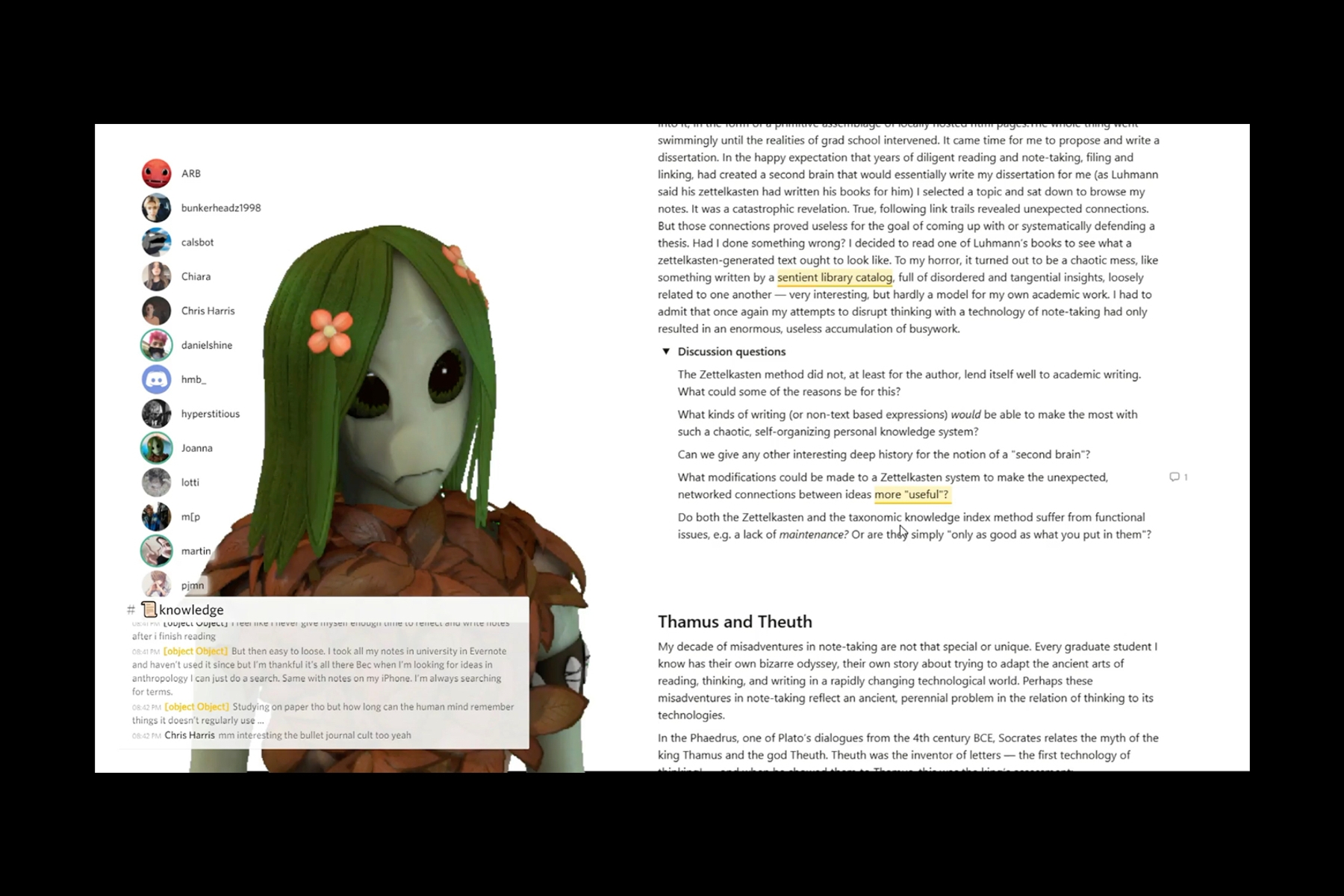
CB: Even though Trust exists far beyond the maintainers and has its own inertia and identity, many of the decisions surrounding the use of resources and the distribution of opportunities are still done by a small centralized group. Now Trust is working on giving over agency and responsibility over decision making to the members and following on from the Black Swan working group in 2021, we recently started a year long series of experiments into defining a member governed treasury for Trust.
We’re hoping to find ways of enabling the extended Trust community to decide what to do with shared resources and create new opportunities for people to experiment together and participate in each other's ideas as they take shape. As part of this we are growing a member-governed treasury to fund collective initiatives.

Calum Bowden collaborates on stories, worlds, and platforms that reconnect the cultural with the technological, economical, political and ecological. He co-founded Trust, as well as Black Swan: a collective pursuing horizontal and decentralised approaches to art-making.
Joanna Pope is a researcher, writer, and composer. Her areas of interest include blockchain art, online aesthetics, and virtual belonging. As a maintainer of Trust, Joanna facilitates voice and chat-based formats for the online community.
Arthur Röing Baer works with community design, building new infrastructures and narrative formats to support the creation and maintenance of digital cooperatives and commons. He is a co-founder of Trust and Moving Castles, a game design studio.
Eva Jäger is Curator of Arts Technologies at Serpentine and Co-investigator of the Creative AI Lab–a collaboration between Serpentine and King’s College London’s Department of Digital Humanities. In 2020-2021 she developed the R&D Labyrinths series together with Trust to produce new formats for showcasing artistic research; in 2022 she commissioned and curated, Hivemind, a Serpentine Digital Commission by Trust.
---
Hivemind is an open source project that can be downloaded at https://github.com/Trust-Support/Hivemind
Tune in to Serpentine’s Twitch on 16th August at 6pm BST for the launch of R&D Labyrinths Season 2 with Libby Heaney on Quantum Computing - https://twitch.tv/serpentineuk
